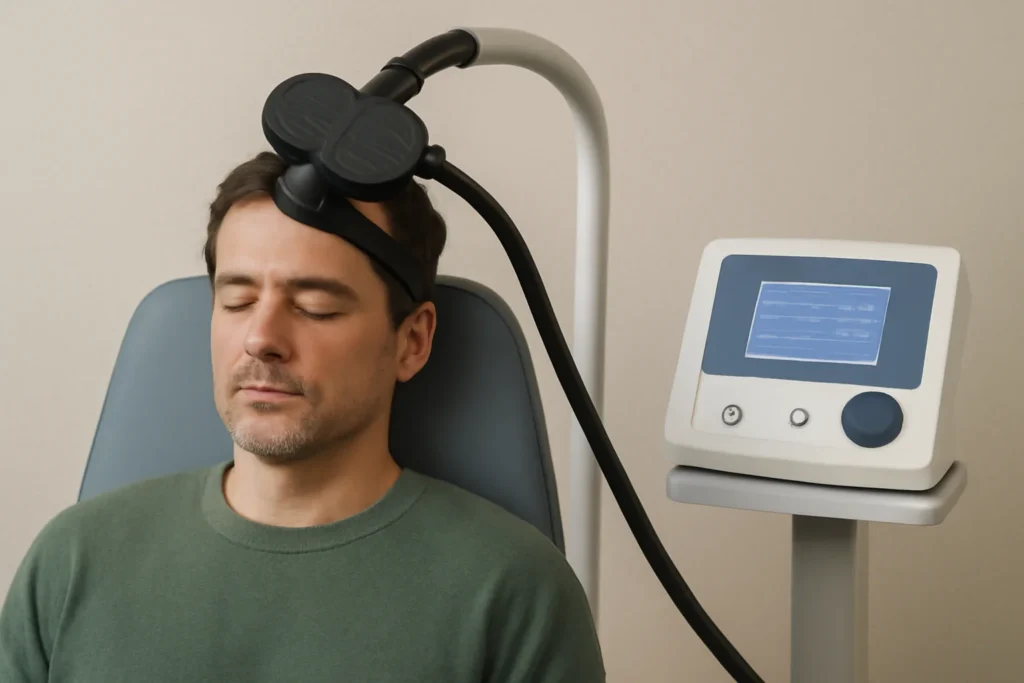Transcranial Magnetic Stimulation (TMS) has emerged as a promising non-invasive therapy for individuals suffering from mental health conditions such as depression, anxiety, and PTSD. While TMS has helped many people improve their well-being, there are concerns regarding its side effects, particularly its potential impact on memory.
If you’re considering TMS as a treatment or are already undergoing it, you may be wondering: can TMS cause memory loss? In this article, we’ll explore what TMS is, its effects on memory, and provide practical insights into how to handle any potential cognitive concerns.
What Is TMS?
Transcranial Magnetic Stimulation (TMS) is a cutting-edge treatment that uses magnetic fields to stimulate specific areas of the brain. It has become especially popular for treating conditions like depression, anxiety, and PTSD, particularly for patients who have not responded well to traditional medications or therapy.
How TMS Works
During a TMS session, a magnetic coil is placed on the scalp. The coil emits targeted magnetic pulses that pass through the skull and activate neurons in the brain. The goal is to help restore normal brain function in areas that regulate mood, reducing symptoms of mental health disorders like depression.
Common Side Effects of TMS
While TMS is generally well-tolerated, some people may experience mild side effects, which are typically temporary. These can include:
- Headaches
- Scalp discomfort or slight pain during the procedure
- Dizziness or lightheadedness
- Tingling sensations on the scalp
These side effects are generally short-lived and go away shortly after the session ends.
TMS and Mental Health Treatment
TMS has proven to be highly effective for many individuals struggling with mood disorders. For patients who haven’t found relief from medications or psychotherapy, TMS offers a valuable alternative. However, with any new treatment, it’s important to be mindful of its potential effects on the body, including cognitive function like memory.

Can TMS Cause Memory Loss?
As with any medical treatment, concerns about side effects are normal. One of the most frequently asked questions about TMS is whether it can cause memory loss. Let’s delve into what the research says and whether this treatment truly impacts memory.
Scientific Research on TMS and Memory
Research on the effects of TMS on memory is still ongoing. However, current studies suggest that while TMS can cause temporary cognitive changes, such as memory difficulties, these effects are typically short-term. Most studies indicate that TMS does not result in lasting memory impairment. Instead, any cognitive changes tend to resolve once treatment concludes.
Some individuals may experience a brief period of memory difficulties, especially in the early stages of TMS. But for the majority, these issues are minimal and fade after the treatment course is over.
Does TMS Cause Memory Loss?
In short, for the vast majority of patients, TMS does not cause memory loss. While temporary memory lapses have been reported, these are typically short-lived. These lapses are more likely to affect short-term memory — for instance, difficulty remembering things that happened within the last few hours — rather than causing long-term memory loss.
Short-Term vs. Long-Term Memory Loss
It’s important to differentiate between short-term and long-term memory loss. Short-term memory loss refers to a temporary inability to recall recently learned information, whereas long-term memory loss involves forgetting events or information that occurred far in the past. The memory issues tied to TMS are usually related to short-term memory and are transient in nature, typically disappearing once the treatment concludes.
Factors That May Influence Memory During TMS Treatment
Not every person reacts to TMS the same way, and several factors can influence whether or not someone experiences memory changes during treatment. Understanding these factors can help you better manage your expectations if you’re considering TMS.
Individual Differences
Everyone’s brain is different, so individual responses to TMS can vary. Factors like age, pre-existing mental health conditions, and overall cognitive health can all affect how your brain responds to TMS. While some may experience temporary cognitive changes, others may not experience any memory issues at all.
Treatment Duration and Frequency
The length of each TMS session and the frequency of treatments can also play a role in whether memory problems arise. Longer or more frequent sessions might increase the likelihood of temporary memory issues, though most people find these effects to be mild and short-lived. If memory loss becomes a concern, you can discuss altering the frequency or intensity of the treatment with your healthcare provider.
Existing Cognitive Issues
If you already have pre-existing cognitive issues, such as a history of memory problems or neurological conditions, you may be more prone to experiencing memory difficulties during TMS. In these cases, it’s important to inform your healthcare provider beforehand to make sure that TMS is an appropriate option for you.
What You Can Do If You Experience Memory Issues During TMS
While TMS is generally safe and effective, it’s important to know what to do if you experience memory concerns during treatment. If you notice any changes in your cognitive function, there are steps you can take.
When to Speak Up
If you’re undergoing TMS and notice any issues with your memory, it’s important to let your healthcare provider know. They can assess whether the memory changes are related to the treatment or if another factor is at play. Early intervention can help prevent further cognitive issues.
Potential Adjustments to Your Treatment Plan
If memory problems persist, your provider may suggest modifying your TMS treatment plan. This could include reducing the frequency of sessions, adjusting the intensity of the magnetic pulses, or exploring alternative therapies to support memory function.
Cognitive Rehabilitation
In some cases, cognitive rehabilitation exercises may be recommended to help address memory concerns. These exercises are designed to improve cognitive function and memory retention. If you’re experiencing memory difficulties during TMS, cognitive rehabilitation may provide helpful strategies to improve memory and mental clarity.

Key Takeaways
- Does TMS cause memory loss? For the majority of individuals, TMS does not lead to long-term memory loss. Any memory issues that do occur are typically temporary and resolve once the treatment is over.
- Memory problems, if they occur, are usually related to short-term memory and are brief in nature.
- Factors such as individual health, treatment duration, and frequency can influence whether or not memory issues arise during TMS.
- If memory concerns arise, speak with your healthcare provider about adjusting the treatment plan or incorporating cognitive rehabilitation.
Final Thoughts
Transcranial Magnetic Stimulation, or TMS, is a really good option for lots of people dealing with mental health issues. It’s especially helpful for those who haven’t found relief with standard treatments.
Now, TMS can sometimes lead to minor, short-term memory problems for a few folks. But, usually, these effects don’t stick around for long. If you notice any thinking challenges during your treatment, talking things over with your doctor is key. They can help you tweak your treatment plan and sort out any worries you have.
When you get a handle on how TMS works and what might affect your memory, you’ll be in a better spot to decide if it’s the right path for you.
